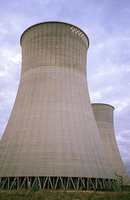Prior to the Fukushima nuclear power plant disaster in Japan, the nuclear energy industry was poised for a global expansion of unprecedented size. Proponents of nuclear energy still see a bright future in a world where electrical demand grows hand in hand with a burgeoning global middle class and everybody wants to reduce CO2 emissions. But vociferous industry opponents now claim nuclear power has been dealt a Chernobyl-like deathblow. Unsurprisingly, most pessimists are found in the advanced West -- witness Germany's decision to abandon nuclear power -- while most optimists are found in emerging economies such as China and India.
This presents an interesting problem for the United States, which by its very nature is far less likely to meekly accept its presumed historical decline than either Europe or Japan. If the West bows out of the nuclear energy expansion, it's only natural that China and India will turn to indigenous production to meet their ambitious schedules of new nuclear construction. That will leave the West lingering in an age of allegedly "clean coal" and revolutionary shale-gas "fracking" technologies, both of which come with more compelling environmental costs, while China and India could conceivably end up with more carbon-competitive industrial sectors to go with their unapproachably vast sums of cheap labor.
For a country looking to boost its high-tech exports, this is not an appealing pathway, especially considering how many current and future emerging economies outside of Asia appear highly interested in moving toward the nuclear-powered generation of electricity -- to include the collectively hydrocarbon-rich Middle East and rapidly globalizing Africa. But of course, with its hyperpartisan -- and thus paralyzed -- political scene, the U.S. will have trouble placing Fukushima in any sort of realistic perspective. After all, we're trying to defend a shrinking middle class, while both China and India are looking to placate their ballooning and increasingly restive cohorts.

